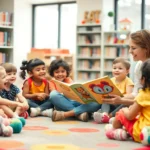Table of Contents
ToggleIn a world where learning never stops, adults often find themselves juggling careers, families, and the occasional Netflix binge. But who says education is just for kids? With a wealth of resources at their fingertips, adults can dive back into the learning pool without the need for floaties. Whether it’s mastering a new skill or finally tackling that long-forgotten hobby, the opportunities are endless.
Imagine swapping out the couch for a classroom—albeit a virtual one—and unlocking new potentials. From online courses that let you learn in your pajamas to community workshops that offer hands-on experience, educational resources for adults are more accessible than ever. So why not embrace the challenge? After all, age is just a number, and the quest for knowledge is a journey worth taking.
Overview of Educational Resources for Adults
Adults seeking to enhance their knowledge and skills can access a variety of educational resources. Online platforms offer courses in diverse subjects, enabling learners to study at their own pace. Websites like Coursera and edX provide courses from prestigious universities, covering everything from technology to humanities. Many community colleges also cater to adult learners with certificate programs or general education classes.
Local libraries serve as valuable resources, often hosting workshops and providing access to online databases. Community workshops, led by local experts, can enhance practical skills in areas like woodworking or cooking. Nonprofit organizations frequently offer free or low-cost training programs, especially in high-demand fields like healthcare and technology.
Webinars and podcasts cater to auditory learners, delivering information on various topics conveniently. Networking events enable adults to connect with professionals in their fields, making educational opportunities more accessible. Additionally, mentorship programs, pairing learners with experienced professionals, support personal development in specific career paths.
Many adults benefit from mobile applications that make learning convenient while on the go. Apps like Duolingo focus on language acquisition, while others teach coding or graphic design. These tools allow learners to integrate education into busy lifestyles, making lifelong learning achievable.
Ultimately, understanding and utilizing available resources can significantly impact personal and professional growth. Each tailored educational opportunity helps adults build competencies and achieve their career aspirations.
Types of Educational Resources

Various educational resources are available for adults, facilitating lifelong learning and skill enhancement. These resources cater to diverse interests and learning preferences.
Online Courses and Webinars
Online courses offer flexibility and accessibility, allowing adults to learn at their own pace. Platforms like Coursera and edX provide courses from top universities in subjects such as business, technology, and arts. Many of these courses include video lectures, assignments, and forums for discussion. Webinars, often interactive, cover specific topics and encourage participant engagement. Through these online formats, adults gain knowledge without geographical barriers.
Community College Programs
Community colleges present a valuable option for adult learners seeking structured education. They offer certificate programs and associate degrees in fields like healthcare, technology, and business. Many programs focus on practical skills that align with local job market needs. Enrollment usually features flexible schedules, including night and weekend classes. These institutions often provide financial aid options, making education more affordable for adult students.
Libraries and Learning Centers
Libraries serve as essential educational resources for adults, providing access to a wide range of materials and programs. Many local libraries host workshops, classes, and lectures on various topics. Learning centers offer additional resources, including tutoring and study groups. Additionally, libraries often provide free access to online databases and learning tools, such as language learning and career development platforms. Utilizing these resources promotes ongoing education and fosters community engagement.
Benefits of Lifelong Learning
Lifelong learning brings numerous advantages to adults seeking to improve their lives. Embracing education beyond traditional schooling fosters both personal and professional development.
Personal Growth and Development
Participation in educational programs enhances self-esteem and confidence. Engaging with new subjects stimulates creativity and encourages critical thinking. Adults often find that exploring diverse topics broadens their perspectives and enriches their personal lives. Additionally, setting learning goals leads to a sense of accomplishment, reinforcing motivation. Those who pursue hobbies or skills gain not only knowledge but also relaxation and enjoyment. Lifelong learning creates opportunities for social interaction, connecting individuals with like-minded peers. This engagement cultivates a sense of belonging, benefiting their overall well-being.
Career Advancement Opportunities
Lifelong learning significantly impacts career progression. Acquiring new skills can lead to job promotions or transitions into different fields. Employers value candidates who actively seek professional development, as it demonstrates initiative and adaptability. Completing online courses or certifications often results in enhanced qualifications, making applicants more competitive in the job market. Networking through educational platforms opens doors to mentorship and collaboration, fostering career connections. Furthermore, embracing technology-related training ensures professionals stay current with industry trends. Consistently upgrading skills allows individuals to navigate evolving job requirements effectively.
Challenges in Accessing Educational Resources
Accessing educational resources poses several challenges for adults. Financial barriers significantly impact many individuals looking to improve their skills or pursue new interests.
Financial Barriers
High costs of courses often deter adults from enrolling in programs. Tuition fees for community colleges or online platforms can create obstacles. Financial aid options exist, yet navigating these can be complicated. Many adults juggle their responsibilities, making it difficult to allocate funds for education. Scholarships aimed at adult learners can help reduce costs, but they may not be widely known or accessible. Understanding available funding sources is crucial in overcoming these hurdles.
Time Constraints
Busy schedules often limit adults’ ability to pursue educational opportunities. Family commitments, work obligations, and personal responsibilities compete for attention. Many adults find it challenging to balance learning with their daily routines. Flexible online courses provide some relief, yet not all formats suit every individual. Even with flexible scheduling, time management skills are essential for successful learning. Prioritizing education amid a packed schedule requires commitment and determination. Adapting learning to fit their lives helps adults make the most of available resources.
Embracing lifelong learning opens doors to new opportunities and personal growth for adults. With a wealth of resources like online courses community colleges and local workshops available it’s easier than ever to pursue education at any stage of life.
By taking advantage of these options adults can enhance their skills gain confidence and expand their horizons. Overcoming challenges such as financial constraints and time management is crucial but the rewards of investing in education are invaluable.
Adult learners not only enrich their own lives but also contribute positively to their communities and workplaces. The journey of learning is ongoing and the pursuit of knowledge is a powerful tool for achieving both personal and professional aspirations.





